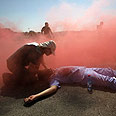According to a Thursday report in Yedioth Ahronoth, the former official – speaking anonymously with the New York Times – detailed the formula by which Israel assessed the magnitude of Tehran's response: "1991 + 2006 + Buenos Aires, times three-to-five."
Related stories:
- 'US has contingencies for Iran strike'
- Hezbollah: Israel can't fight Iran alone
-
'Iran ready to wipe Israel off the map'
In other words: The combined result of Saddam Hussein's missile attack on Israel in 1991, Hezbollah's missiles attacks on Israel during the 2006 Second Lebanon War and the terror attacks in Argentina's capital in the early 1990s – times three.
These attacks claimed the lives of hundreds of Israelis and Jews and the damage to the Israeli economy amounted to billions of dollars.
"Forty missiles fired at Israel are no small matter – but it's better that a nuclear Iran," he said.
The New York Times said that the assessment is based on the premise that while Iran would aspire to meet any strike with force, it would prefer not to ignite a regional war.
US defense experts, however, qualified the statement, saying the West's ability to accurately predict Iran's moves was limited.
Washington, the report said, believes that a strike on the Islamic Republic would result in a missile barrage on Israel; but it also believes that Iran would try to somehow disguise its connection to such a counter-attack, possibly by promoting terror attacks on nations who support Israel.
The Americans also believe it is likely Iran will use any such strike as a pretext to close off the Strait of Hormuz.
US defense sources said that Tehran is likely to try and avoid a direct attack on American interests, because the regime knows that an American military strike will inflict significant damage.
Washington does, however, think Iran will opt for an indirect assault against its interests worldwide, or against oil production facilities in the Persian Gulf.
Meanwhile, the Los Angeles Times reported that the Obama Administration is unlikely to change its stance on Iran.
The White House believes that the US must stop Iran from getting a nuclear weapon, but that does not mean it is ready to declare that the US will impede Iran's desire for "nuclear capabilities."
A proposal to that effect has already been brought before Congress, and is widely backed by AIPAC.
US President Barack Obama is set to speak at the next AIPAC conventions in Washington, where he is expected to detail the US' "red lines" on Iran.
Yedioth Ahronoth's Washington correspondent contributed to this report
- Receive Ynetnews updates
directly to your desktop
















